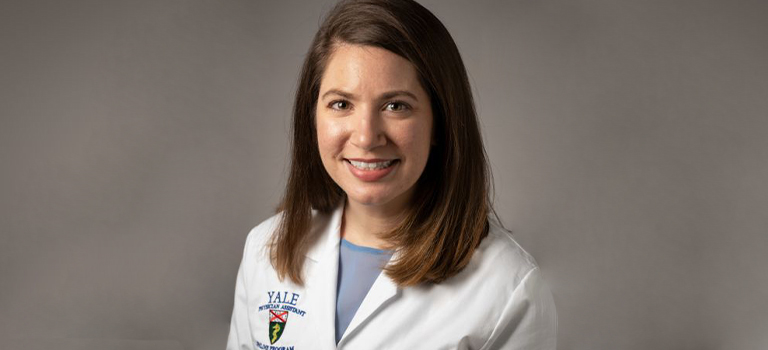Yale PA Online Student Anna Vignola Receives First Place in Yale-UCL Poetry Competition

Yale PA Online Student Anna Vignola
This article was originally posted by the Yale School of Medicine.
“It is hard to write a short poem well but this is a tiny masterpiece – no word is wasted, with the title itself part of this single perfect sentence.” So begins the judges’ description of Anna Vignola’s poem, After Closing the Cadaver, which received first placein the Yale-UCL Poetry Competition in the category for students of medicine and allied disciplines. Vignola, who is a second-year student in the Yale School of Medicine Physician Assistant Online Program, received £1000 ($1370) for her winning entry.
The COVID-19 pandemic did not interfere with the tenth year of the Yale-UCL competition. Rather, it led the organizers to expand it. Traditionally the competition only included health professional students. This year it had a new category for all Yale/UCL students on a topic that addressed a recognizably medical or public health-related theme.
In materials announcing the expanded contest, the organizers wrote “poetry can be a powerful medium for human beings to make sense of their place in the world. In a world marked by the Coronavirus pandemic, this function of poetry seems particularly important.” They explained that the competition in the past had allowed students from the two universities “to make sense of their particular experiences and to produce some extraordinary poetry.”
The winners were announced during a virtual event on February 3, with viewers joining from the U.S. and U.K. Poet, playwright, and journalist Clare Pollard and poet, pediatrician, and writer Dr. Irène P. Mathieu served as judges.
Each of the winners recited their poem and spoke about what led them to write it. After saying she was honored to participate, be part of this community, and be selected as the winner, Vignola explained she wrote the poem after time in the cadaver lab. She shared that as she transitioned beck to the “realm of the living,” she felt such joy and appreciation for being alive, but also sadness and grief, leaving behind those from whom life had been stripped.
After Closing the Cadaver
I come home
to admire the contours
of a chest rising
and falling
in sleep
the shock
of warm skin
as I crawl to him sinking
into the sweetness
and guilt of being
alive
Judges’ comments:
“It is hard to write a short poem well but this is a tiny masterpiece – no word is wasted, with the title itself part of this single perfect sentence.”
“There is such shock and dissonance encapsulated in the way we move from the professional language of ‘closing the cadaver’ in the title to being, just a moment later, ‘home’, and asked to look upon a beloved living body; to enjoy this precious life. The difficulty and guilt the speaker experiences in making this shift is movingly conveyed.”
Citation for this content: Yale School of Medicine Physician Assistant Online Program.

